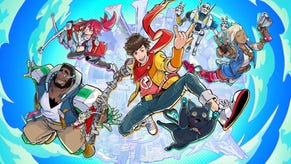State of Play: Ubisoft
CEO Yves Guillemot and executive director of EMEA territories, Alain Corre on the publisher in 2011
And as for the next generation? Prepare your pads and pencils Microsoft and Sony, because Guillemot has some demands.
"So we need the next generation quickly so that creativity increases a lot," he said, and was happy to list what he thought was vital for their success.
We need the next generation quickly so that creativity increases a lot
Yves Guillemot
"More interaction with people, the possibility to adapt content to the time that people want to play. So to be more of a service to consumers that can get out. So the software will have to be very different so that everyone can play and can take from those the games the bit they want to get."
He also backed Avni Yerli's suggestion that publishers should able to update and change content more quickly, to allow for free-to-play and other business models iss also vital.
"But it's not only the free-to-play models. The concept is being able to change the experience on a regular basis, easily and fast. And that's something I think will be needed for the next generation, the possibility for the publisher to actually change his games very quickly so they are adapted to the consumer."
And if anyone knows the more casual consumer and free-to-play models, it's Ubisoft.
"Last year casual games was 40 per cent of our revenue," reveals Corre. He sees the family audience as keen to buy games, if only people will develop games that suit their needs. And Guillemot used Ubi's Just Dance series, which has been a huge success for the company, as an example.
"We were amazed by the success of Just Dance and it showed that lots of people, when you really bring the game that they are interested in, they actually buy huge quantities."
"In the long term there's no reason why the casual would not overcome the hardcore business because there are more people that are interested in buying casual," he explains.
Unsurprisingly, they're looking for new ways to tap into the market, and building on their browser and free-to-play titles.
In the long term there's no reason why the casual would not overcome the hardcore business.
Yves Guillemot
"They are good models and it's funny because we have gotten so many customers so quickly," said Guillemot.
"Smurfs went from zero to 4.2 million without marketing in two weeks. So it's amazing how fast, when the content is adapted, those products can grow. So it really shows that people are very interested by new content in games. So we will continue to develop and make sure the quality of the game experience is adapted to what people are looking for."
As EA snaps up Popcap, Microsoft focuses on Kinect and Sony plays with its Eyepet, it feels like everyone is obsessed with accessing that casual, family demographic. The thing is, Ubisoft are already doing that, and they've been doing it for years. And with the Imagine brand currently the next area of Ubisoft lined up for an online makeover, the percentage of revenue from that sector will only grow.
"With the arrival of the free-to-play and the world again is open to buy games, because the free-to-play model you are connected so you can't pirate," said Guillemot.
"And because you can't pirate it generates revenue and you can put marketing in all those territories. So your brand continues in a way it doesn't when people pirate your games."
"So this huge revolution is extremely positive for the games industry because it's going to help the companies that are already present in the industry to actually expand their brands to a very broad audience in all the world."




-(1)_16x9.png?width=291&height=164&fit=crop&quality=80&format=jpg&auto=webp)



